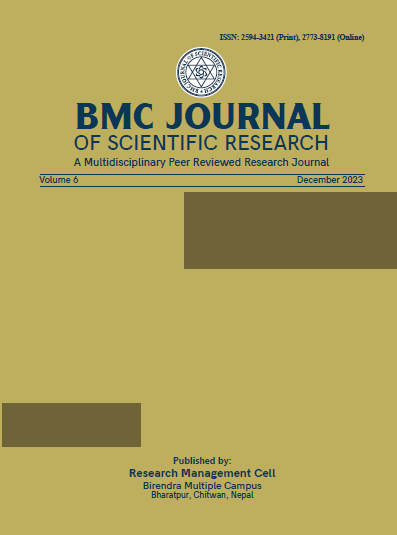Study of Fiber Yielding Plants of Devchuli Municipality Ward no.13, Nawalparasi
DOI:
https://doi.org/10.3126/bmcjsr.v6i1.60951Keywords:
Fiber, Ethnobotany, indigenous, unemployment, familiesAbstract
Ethnobotany deals with the study of the use of plants by humans and the relation between humans and vegetations. The indigenous people around the world have established their own local knowledge on plant utility, management and conservation since time immemorial. It has attracted much attention in recent years. In Devchuli-13 (Daldale) area, local people depend on fiber yielding plants in their daily life because most of them do farming and rearing animals. These plants are mostly used while collecting fodder and dried tree branches from the near forest or pasture lands. The total of 52 fiber yielding plants species belonging to 45 genera and 24 families has been documented among them. Poaceae family with 17 species is largest. Large number of plant species found are herbs (about 39%) are herbs followed by trees, shrubs and climbers. Among these plant 21 species are mostly used by the local people. Most of these plants are used for making ropes baskets, mats followed by making brooms. The most common parts used are whole plant of herbs, stem/bark of trees (xylem, phloem, cortical fibers) while roots are very rarely used. Large number of highly valuable plants are reported which can improve the economic condition of people or creating the scope for small businesses. Documentation of ethnobotanical knowledge of traditional practices is gradually going to disappear from the elder to younger generations. So, proper documentation of fiber yielding plants with their economic value is very important. Addressing these set of skill is very important to eradicate the immerging problem of unemployment.
Downloads
Downloads
Published
How to Cite
Issue
Section
License
Copyright (c) 2023 Research Management Cell, Birendra Multiple Campus

This work is licensed under a Creative Commons Attribution-NonCommercial-ShareAlike 4.0 International License.




